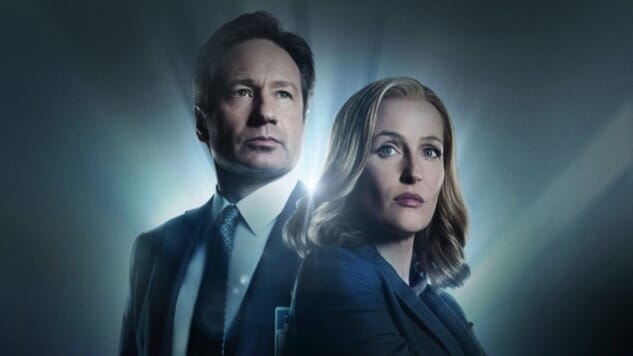Paranoia, Faith and Why We’ll Always Need The X-Files

For many fans, the excitement that greeted last year’s announcement of a 10th season of The X-Files couldn’t help but be mixed with some skepticism. After all, it had been 13 years since the series went off the air, and in the meantime there had been a feature film, The X-Files: I Want to Believe, that had been widely panned by most critics and X-philes, especially coming on the heels of the show’s much-disputed last two seasons. With the announcement coming not too long after the news of David Lynch returning to Twin Peaks, the fear was thick in the air that The X-Files would feel like little more than another nostalgia object in our current nostalgia-obsessed entertainment landscape (witness, too, belated movie sequels like Zoolander No. 2 and even, yes, Star Wars: The Force Awakens).
And yet, if ever there was a show that could weather the passage of time, it was The X-Files. Not that you would necessarily know that from the mixed reviews that greeted the six-episode 10th season, when it finally made it to the airwaves earlier this year. It’s the nature of that complicated reception that’s worth noting, however. For the most part, the bookend mythology episodes came in for the hardest knocks, while most of the standalone installments in the middle—save for the controversial “Babylon,” with that goofy scene of Fox Mulder (David Duchovny) tripping on mushrooms while investigating a suicide bombing in Texas—were more warmly embraced.
But then, it was always ever thus with Chris Carter’s creation, with a split between serial drama and anthology encoded into its DNA from the start. The reactions to the 10th season weren’t all that different, really, from those that greeted The X-Files in its first nine seasons, especially its later ones. Even as some fans began losing interest in its overarching storyline revolving around alien factions, government cover-ups and the seekers in the middle aiming to discover and expose the truth, there were always those freaky one-off mysteries to keep one diverted—episodes that allowed for a wider variety of sensibilities and a greater level of invention than the mytharcs’ more immediate plot-advancing concerns. This was even the case in Seasons Eight and Nine, when Mulder became a less prominent character and Carter tried to pave the way for a second generation with new investigators John Doggett (Robert Patrick) and Monica Reyes (Annabeth Gish). Though that ultimately didn’t take, one could at least bask in some of the exuberantly weird cases they investigated in those last two years, ranging from human bats and Christ-like slugs, to childhood monsters come to life and even God Himself donning Hawaiian shirts and a deck of cards.
-

-

-

-

-

-

-

-

-

-

-

-

-

-

-

-

-

-

-

-

-

-

-

-

-

-

-

-

-

-

-

-

-

-

-

-

-

-

-

-








































